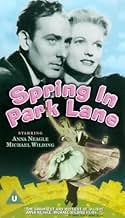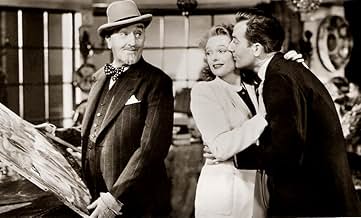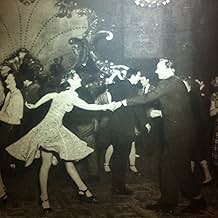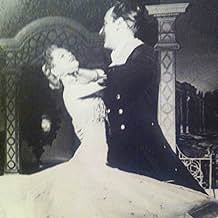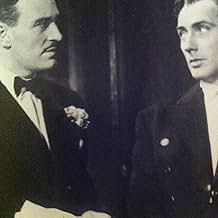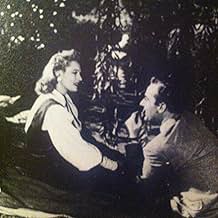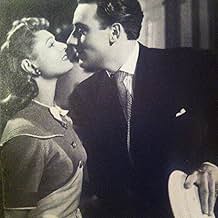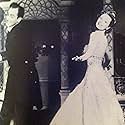A diamond merchant's niece falls for his new footman who is really an impoverished aristocrat.A diamond merchant's niece falls for his new footman who is really an impoverished aristocrat.A diamond merchant's niece falls for his new footman who is really an impoverished aristocrat.
- Director
- Writers
- Stars
- Awards
- 2 wins & 1 nomination total
Cyril Conway
- Antique Dealer
- (uncredited)
Guy Deghy
- Porteus - Dinner Guest
- (uncredited)
H.R. Hignett
- Higgins
- (uncredited)
Tom Walls Jr.
- Bates
- (uncredited)
- Director
- Writers
- All cast & crew
- Production, box office & more at IMDbPro
Featured reviews
This is a lighthearted, very British romance with a fine cast. The story revolves around a merchant's daughter, Anna Neagle as Judy, who falls in love with their new servant, Richard, played by Michael Wilding, who is actually a nobleman fallen on hard times temporarily. As dancing partners they are sublime in the gentle romantic interludes which create lovely highlights to the movie. Don't miss it. The script moves along well with witty dialogue and interesting interaction among the characters. Excellent British fare with lots of charm.
According to IMDB and TCM, "Spring in Park Lane" made more money than any other British film the year it debuted. In fact, it apparently is one of the highest attended pictures ever in the UK...so it's obvious that the film was very popular...so popular they reunited Michael Wilding and Anna Neagle repeatedly.
The story finds Richard (Wilding) applying for a job as footman for the Howard family. Judy (Neagle) hires him....but soon her uncle (the head of the household) regrets this when Richard informs him he bought a forged painting. After all, what would a footman know of art? What none of them realize is that Richard was once wealthy and sophisticated but recently lost his money and was forced to seek work...and he did know what he was talking about when it came to art. As for Judy, she just knows that Richard is delightful and they are starting to fall in love.
In many ways, this is a lot like "My Man Godfrey"...with a well-bred man arriving in the guise of a servant and helping a family in many ways. But it's not really a comedy like the earlier film...and the emphasis is more on romance. A nice picture..well worth seeing...though not exactly up to the hype surrounding it (few films ever are).
The story finds Richard (Wilding) applying for a job as footman for the Howard family. Judy (Neagle) hires him....but soon her uncle (the head of the household) regrets this when Richard informs him he bought a forged painting. After all, what would a footman know of art? What none of them realize is that Richard was once wealthy and sophisticated but recently lost his money and was forced to seek work...and he did know what he was talking about when it came to art. As for Judy, she just knows that Richard is delightful and they are starting to fall in love.
In many ways, this is a lot like "My Man Godfrey"...with a well-bred man arriving in the guise of a servant and helping a family in many ways. But it's not really a comedy like the earlier film...and the emphasis is more on romance. A nice picture..well worth seeing...though not exactly up to the hype surrounding it (few films ever are).
"What did you say, Richard?" "What did you say?" So, the leading ladies of "Spring in Park Lane" keep asking Richard. Richard is the new footman for the Howard household. In reality, he is Lord Richard Borechester. But, he's gone underground until he can solve a family crisis. It doesn't take one long to figure this out, so it's not giving any of the plot away.
The "what" that Richard says, that begets these questions throughout the film, is his use of interchangeable words. It's similar to malapropism -- use of a word that sounds like another, in place of the other, so that it's nonsensical or doesn't make sense. Most often those are unintended, so the person comes off as very funny, and possibly naïve or not well read. But in this case, Richard intentionally uses words that he then has to revise in wholly different sentences in order to give an acceptable answer.
The result is a double dose of comedy. First, in the out of place or contentious comment Richard makes, and then in his revised rejoinder. And, with those, the other parties to the comments show appropriate expressions of disbelief, indignity or shock. It's all very hilarious.
Anna Neagle and Michael Wilding are the leads in this upstairs-downstairs plot of a comedy romance. They are a wonderful match and starred together in half a dozen movies. All are very good, but their comedies especially stand out. Most of their pairings involve a couple of songs and/or dance numbers. Neagle and Wilding were highly popular screen stars in the U.K. in the mid-20th century. Wilding was known more in the U.S. around that time as having been the husband of Elizabeth Taylor - the second marriage for both. Unfortunately, most of the British films Wilding and Neagle were in didn't receive wide distribution at the time in the U.S. Both were very talented and likeable performers.
Wilding was something of a combination Danny Kaye and Cary Grant. He could act in a variety of genres but was superb in comedy. He brought an energy and sprightliness to his roles. Again, much like Kaye and Grant. He was quick fire with witty lines, and he could do some funny accents or voice imitations and sounds. Wilding did have one drawback - he sometimes rattled off a line or comment so quickly and almost hushed, that it was hard to hear him. One wonders if that was just a habit that directors couldn't get him to correct. Or, more likely, it was because he ad-libbed some lines, and they couldn't be filmed over with the same initial effect from the rest of the cast.
I don't know if the malaprops in the film come from the source book or from the playwright who wrote the film script. But, it's a very clever and unique method that works so well for this plot and the characters. Malaprops have been used ever since the beginning of sound film. But they have been mostly single instances for comedy. I don't think any other movie has been made that relies on such use of lingo as a huge part of its screenplay. For that reason alone, "Spring in Park Lane" stands out.
The movie is based on a 1916 novel by Alice Duer Miller, "Come Out of the Kitchen." Miller was an American author and suffragist, who wrote poetry, screenplays, and novels. Others of her poems and books were made into movies. Among the films are "Manslaughter" of 1930, "Roberta" of 1935, "The White Cliffs of Dover" of 1944, and "Lovely to Look At" of 1952.
"Spring in Park Lane" also belongs to a small group of films in which the butlers and/or maids are principals in the plot and provide much of the comedy. The best known of these probably is "My Man Godfrey" of 1936. But there are half a dozen others - this one among them, which are as funny as or better than Godfrey.
Here are some sample lines from the film. For more funny dialog, see the Quotes section under this IMDb Web page of the movie.
Judy Howard, "Richard, why don't you just go to the police and take what's coming to you?" Lord Richard, "The police? What on earth for? I haven't done anything." Judy, "Oh, well, you've answered that one anyway."
Uncle Joshua Howard, "Mildred, in affairs of the heart, you have all the delicacy of a bulldozer."
Lord Richard, "You're very beautiful, if I may say so, Miss Judy." Judy Howard, "What was that?" Richard, "I said it was a very beautiful evening, miss." Judy, "Did you?"
Uncle Joshua Howard, "Hmm. I don't mind Judy marrying blue blood, but I'm not very partial to red ink."
Rosie, "Mr. Maitland, I've got one of your photos. Do you think you could meet me on the back stairs in five minutes to sign it? It's a bit dark there. But Richard says that sometimes that's where a star's born."
Judy Howard, "Are you in the habit of making love to your employer's secretary?" Lord Richard, "No, miss. That was my first experience in that branch of domestic service."
Judy is playing the piano and Richard is polishing the floor and looking at her legs. When he slips and makes a noise she stops playing and comes around the piano. Judy, "You um, like music, Richard?" Lord Richard, "Yes, miss, especially pretty feet." Judy, "What did you say?" Richard, "I said, especially that petite suite, miss." Judy, "Which petite suite?" Richard, "That Petite Suite of Tchaikovsky you were just playing." Judy, "Oh, mmm. That's what it sounded like?" Richard, "Oh, yes, vaguely, miss, heh, heh." Judy, "It may have sounded like it, Richard, but it was not the Petite Suite of Tchaikovsky." Richard, "No, miss?" Judy, "No, Richard."
The "what" that Richard says, that begets these questions throughout the film, is his use of interchangeable words. It's similar to malapropism -- use of a word that sounds like another, in place of the other, so that it's nonsensical or doesn't make sense. Most often those are unintended, so the person comes off as very funny, and possibly naïve or not well read. But in this case, Richard intentionally uses words that he then has to revise in wholly different sentences in order to give an acceptable answer.
The result is a double dose of comedy. First, in the out of place or contentious comment Richard makes, and then in his revised rejoinder. And, with those, the other parties to the comments show appropriate expressions of disbelief, indignity or shock. It's all very hilarious.
Anna Neagle and Michael Wilding are the leads in this upstairs-downstairs plot of a comedy romance. They are a wonderful match and starred together in half a dozen movies. All are very good, but their comedies especially stand out. Most of their pairings involve a couple of songs and/or dance numbers. Neagle and Wilding were highly popular screen stars in the U.K. in the mid-20th century. Wilding was known more in the U.S. around that time as having been the husband of Elizabeth Taylor - the second marriage for both. Unfortunately, most of the British films Wilding and Neagle were in didn't receive wide distribution at the time in the U.S. Both were very talented and likeable performers.
Wilding was something of a combination Danny Kaye and Cary Grant. He could act in a variety of genres but was superb in comedy. He brought an energy and sprightliness to his roles. Again, much like Kaye and Grant. He was quick fire with witty lines, and he could do some funny accents or voice imitations and sounds. Wilding did have one drawback - he sometimes rattled off a line or comment so quickly and almost hushed, that it was hard to hear him. One wonders if that was just a habit that directors couldn't get him to correct. Or, more likely, it was because he ad-libbed some lines, and they couldn't be filmed over with the same initial effect from the rest of the cast.
I don't know if the malaprops in the film come from the source book or from the playwright who wrote the film script. But, it's a very clever and unique method that works so well for this plot and the characters. Malaprops have been used ever since the beginning of sound film. But they have been mostly single instances for comedy. I don't think any other movie has been made that relies on such use of lingo as a huge part of its screenplay. For that reason alone, "Spring in Park Lane" stands out.
The movie is based on a 1916 novel by Alice Duer Miller, "Come Out of the Kitchen." Miller was an American author and suffragist, who wrote poetry, screenplays, and novels. Others of her poems and books were made into movies. Among the films are "Manslaughter" of 1930, "Roberta" of 1935, "The White Cliffs of Dover" of 1944, and "Lovely to Look At" of 1952.
"Spring in Park Lane" also belongs to a small group of films in which the butlers and/or maids are principals in the plot and provide much of the comedy. The best known of these probably is "My Man Godfrey" of 1936. But there are half a dozen others - this one among them, which are as funny as or better than Godfrey.
Here are some sample lines from the film. For more funny dialog, see the Quotes section under this IMDb Web page of the movie.
Judy Howard, "Richard, why don't you just go to the police and take what's coming to you?" Lord Richard, "The police? What on earth for? I haven't done anything." Judy, "Oh, well, you've answered that one anyway."
Uncle Joshua Howard, "Mildred, in affairs of the heart, you have all the delicacy of a bulldozer."
Lord Richard, "You're very beautiful, if I may say so, Miss Judy." Judy Howard, "What was that?" Richard, "I said it was a very beautiful evening, miss." Judy, "Did you?"
Uncle Joshua Howard, "Hmm. I don't mind Judy marrying blue blood, but I'm not very partial to red ink."
Rosie, "Mr. Maitland, I've got one of your photos. Do you think you could meet me on the back stairs in five minutes to sign it? It's a bit dark there. But Richard says that sometimes that's where a star's born."
Judy Howard, "Are you in the habit of making love to your employer's secretary?" Lord Richard, "No, miss. That was my first experience in that branch of domestic service."
Judy is playing the piano and Richard is polishing the floor and looking at her legs. When he slips and makes a noise she stops playing and comes around the piano. Judy, "You um, like music, Richard?" Lord Richard, "Yes, miss, especially pretty feet." Judy, "What did you say?" Richard, "I said, especially that petite suite, miss." Judy, "Which petite suite?" Richard, "That Petite Suite of Tchaikovsky you were just playing." Judy, "Oh, mmm. That's what it sounded like?" Richard, "Oh, yes, vaguely, miss, heh, heh." Judy, "It may have sounded like it, Richard, but it was not the Petite Suite of Tchaikovsky." Richard, "No, miss?" Judy, "No, Richard."
This was the most popular movie in Great Britain the year it was released and still holds the record for most tickets sold in Britain by an all-British production. It was so popular that a poll the following year had Miss Neagle the most popular movie star in Britain: the first time in more than a decade the title went to a British subject.
The story, as well as Miss Neagle were crowd-pleasers. It offered to its audience the happy thought that in the post-War era, Park Lane contains rich young ladies who would gladly marry their footmen -- assuming, of course, they look like Michael Wilding and are actually down-on-their-luck aristocrats.
Miss Neagle's wealth comes from her diamond-dealing uncle, Tom Walls, in a fine performance. The rather tepid plot is eked out by two good dance sequences, one song by Miss Neagle, and a subplot about stolen paintings. The mildly titillating main plot is supported by a rather arch air and the charms of the stars: Mr. Wilding is arch and Miss Neagle by the manner in which every scene with her in it is shot to spotlight her. It's clear, as always that the director, Herbert Wilcox loves Miss Neagle; they had been married five years. I suspect cinematographer Mutz Greenbaum felt the same.
The story, as well as Miss Neagle were crowd-pleasers. It offered to its audience the happy thought that in the post-War era, Park Lane contains rich young ladies who would gladly marry their footmen -- assuming, of course, they look like Michael Wilding and are actually down-on-their-luck aristocrats.
Miss Neagle's wealth comes from her diamond-dealing uncle, Tom Walls, in a fine performance. The rather tepid plot is eked out by two good dance sequences, one song by Miss Neagle, and a subplot about stolen paintings. The mildly titillating main plot is supported by a rather arch air and the charms of the stars: Mr. Wilding is arch and Miss Neagle by the manner in which every scene with her in it is shot to spotlight her. It's clear, as always that the director, Herbert Wilcox loves Miss Neagle; they had been married five years. I suspect cinematographer Mutz Greenbaum felt the same.
What an accomplished team Anna Neagle and Michael Widing were.They must have known each others acting styles intimately.I have them on DVD/video in "The Courtneys of Curzon Street", "Piccadilly Incident" and the subject film.The mode is light romantic comedy a style at which they both excelled so I have rated it 7/10.
An aristocrat, (Michael Wilding), falls out with his dim family and obtains the position of a footman with a posh family who live in Park Lane, an exclusive area of London.Only the butler knows Michael's real identity which he keeps secret but addresses him as "milord" whenever they are alone together.The result is that the Park Lane family are astonished by Michael's savoir-faire and knowledge of the finer things of life.Michael can play the piano well and spot an art forger at 100 paces as well as being charming and witty to the family.Soon he has become irreplaceable as an employee and Anna Neagle (who is the secretary of wealthy Tom Walls) begins to look to Michael for advice on non footman activities.
As time elapses Anna begins to suspect Michael is not all he pretends to be and they arrange a date together on The Serpentine so she can learn more about his background.There is an echo of the scene in "The Merchant of Venice" when Portia has to choose between three suitors.Suitor 1 is a vain self-obsessed actor.Suitor 2 is Michael's dim, boring aristocratic brother (cue comedy of Michael trying to avoid "blowing his cover").Suitor 3, Michael, appears as the poorest suitor but Anna instinctively feels he is the one.I feel sure script writers sometimes borrow and get inspiration from the classics when writing their screenplays.Another of the footman's accomplishments is dancing and the two have a very romantic dreamlike dance together.That's all of the plot I will reveal.This film is readily available so I urge all Wilding/Neagle fans to go out and buy this for their collection.
An aristocrat, (Michael Wilding), falls out with his dim family and obtains the position of a footman with a posh family who live in Park Lane, an exclusive area of London.Only the butler knows Michael's real identity which he keeps secret but addresses him as "milord" whenever they are alone together.The result is that the Park Lane family are astonished by Michael's savoir-faire and knowledge of the finer things of life.Michael can play the piano well and spot an art forger at 100 paces as well as being charming and witty to the family.Soon he has become irreplaceable as an employee and Anna Neagle (who is the secretary of wealthy Tom Walls) begins to look to Michael for advice on non footman activities.
As time elapses Anna begins to suspect Michael is not all he pretends to be and they arrange a date together on The Serpentine so she can learn more about his background.There is an echo of the scene in "The Merchant of Venice" when Portia has to choose between three suitors.Suitor 1 is a vain self-obsessed actor.Suitor 2 is Michael's dim, boring aristocratic brother (cue comedy of Michael trying to avoid "blowing his cover").Suitor 3, Michael, appears as the poorest suitor but Anna instinctively feels he is the one.I feel sure script writers sometimes borrow and get inspiration from the classics when writing their screenplays.Another of the footman's accomplishments is dancing and the two have a very romantic dreamlike dance together.That's all of the plot I will reveal.This film is readily available so I urge all Wilding/Neagle fans to go out and buy this for their collection.
Did you know
- Trivia"Spring in Park Lane (1948)" was the most popular film in the U.K. for the year 1948. According to the British Film Institute in 2004, it had fifth place in all-time ticket sales in the United Kingdom. As of 2017, its 20.5 million U.K. attendance was still the largest audience for any wholly British movie. It was highly rated and well received in the U.S. as well.
- GoofsMichael Wilding and Anna Neagle misquote the beginning of a poem by William Allingham (whose title is the same as the first line) as "Four ducks on a pond,/The blue sky beyond." It should be "Four ducks on a pond,/A grass-bank beyond,/A blue sky of spring/And birds on the wing."
- Quotes
Judy Howard: Well, where is Perkins?
Lord Richard: Oh, he's butling about somewhere.
- Crazy creditsAbout one-third into the movie, the screen runs credits that introduce the Borechester family: "Borechester Towers. Ancestral seat of the Marquis of Borechester. "A.D. 1100. The Normans started building the walls... "A.D. 1300. The family started hanging their pictures on the walls... "A.D. 1939. The R.A.F. took over and started scribbling on the walls... "A.D. 1947. A Stately home of England -- with the state coming nearer every budget."
- ConnectionsFeatured in The Ultimate Film (2004)
Details
- Release date
- Country of origin
- Language
- Also known as
- Fräulein Privatsekretärin
- Filming locations
- Metro-Goldwyn-Mayer British Studios, Elstree, Herts, England, UK(studio: produced at Metro-Goldwyn-Mayer British Studios, Ltd. Elstree-Herts, England.)
- Production companies
- See more company credits at IMDbPro
- Runtime1 hour 40 minutes
- Color
- Aspect ratio
- 1.37 : 1
Contribute to this page
Suggest an edit or add missing content


